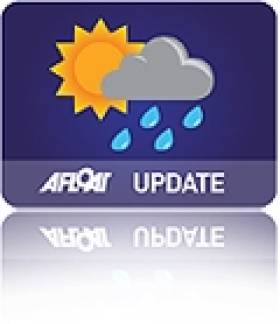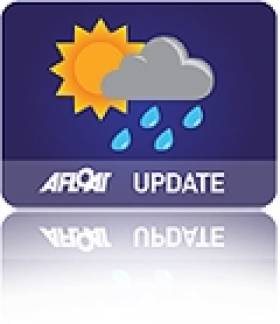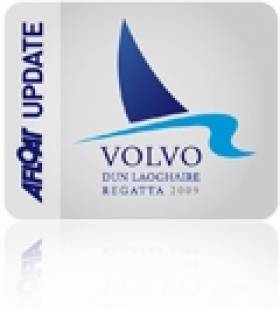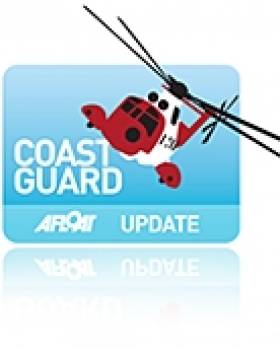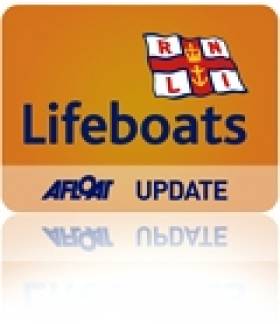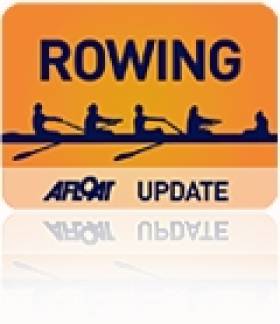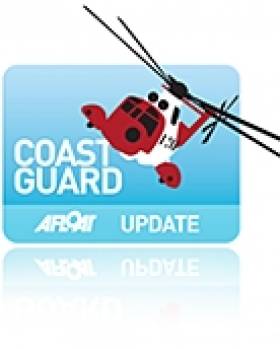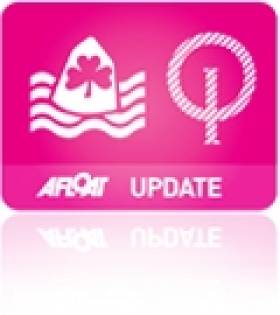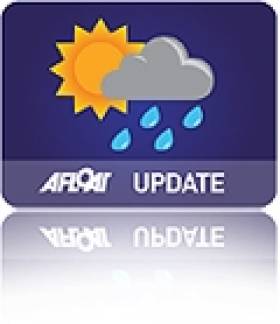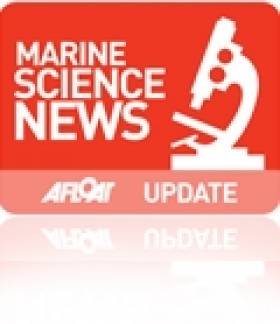Displaying items by tag: Weather
Cold Winter Coming Up, Sailors Expect Dominant Easterly Winds – Weather Guru
#weather – This Winter 2013/14 may be cold again according to the latest ideas coming from a UK weather guru.
If the latest indications are correct then Ireland is more likely to experience a cold winter than a normal or milder one. Frost and snow would likely be above normal levels across the southern half of Ireland, whilst the north is drier.'
Weatherweb.net Managing Director, Dr Simon Keeling, who produces weekly forecasts for Ireland's largest marina at Dun Laoghaire, stressed to afloat.ie that this was not a forecast for winter, but just a statement as to how models and comparisons with previous years pointed to likely weather this winter.
'For sailors it means that the easterly winds are more dominant than usual. However, it's still early days and weather patterns are constantly changing. But for now it's probably best to plan for a cooler than normal winter.
The guidance notes issued by Keeling details his latest ideas for the coming winter (1st December to 28th February) and discusses the likely weather scenarios that will emerge.
'There has been a change in my thinking over the past few weeks. Initially I was of the opinion that the coming winter would be milder than last year, and that 2012/13 was the winter everyone would remember'.
However, this opinion has been changing recently and this evidence was presented to his clients this morning.
Public Urged To Be Aware of Water Risks as Temperatures Soar
#Weather - Irish Water Safety has urged anyone heading to the water on lakes, rivers or beaches during this week's heatwave to take extra precautions as Met Éireann issues a 'yellow warning' amid soaring temperatures.
Speaking to TheJournal.ie, IWS chief John Leach underlined the increased risk of drownings during warmer periods, especially among young people in their teens or early twenties to go swimming in unsupervised areas.
Only today RTÉ News is reporting on the death of a 21-year-old Lisa Knight, who drowned while swimming with friends on the River Feale in Co Limerick in the early hours of this morning.
The heatwave, which is expected to peak on Friday with temperatures in many parts breaking the 30s, has drawn people to coastal areas in droves.
Also on TheJournal.ie, the Irish Coast Guard has reported a 40% increase in call-outs relating to watersport and other leisure activities over the last three weeks compared to the same period in 2012.
A significant number of these relate to rogue jetskiers "tormenting" beach-goers by racing through designated swimming areas on their personal water craft, according to IRCG operations manager Declan Geoghehan.
In related news, the Irish Independent says hoax calls to the coastguard have increased 40-fold since the IRCG was added to the main emergency services accessible by dialling 999 or 112 - and now constitute the "vast majority" of calls received.
#vdlr2013 – A weather expert has allayed fears of a windless start to Volvo Dun Laoghaire Regatta tomorrow in spite of the current calm on Dublin Bay.
An area of high pressure hangs over Ireland on the eve of the event and with little wind on Dublin Bay all week, the question on the lips of over 3,000 sailors in 390 boats gathered in Dun Laoghaire for Ireland's biggest sailing event is; 'will there be wind?'
After two years of planning, organisers fears of a repeat of the inaugural 2005 event, when the event was becalmed for four days, are, it appears unfounded.
UK Met guru Dr. Simon Keeling says, 'hang in there, the winds are coming!'
Last Saturday for DBSC racing, the bay produced a sparkling 15-20 knot sea breeze in bright sunshine (photos and results here) but since then there's been nothing, but glassy calm, heavy, humid air plus a lot of local theories as to why the sea breeze has disappeared.
The good news, according to Keeling of Weatherweb.net, who supplies regular weekly forecasts to Dun Laoghaire marina berth holders, is that conditions look more favourable for a sea breeze tomorrow, although only light.
By Friday, the UK based Keeling says 'winds will turn to the NW around F3 or F4 as high pressure retreats leaving a residual ridge behind'.
We'll keep our fingers crossed.
#Coastguard - The Irish Coast Guard has advised members of the public to pay special attention to water safety this week.
The warm, sunny weather with temperatures in the high 20s is forecast to last for the rest of the week and the weekend, when traditionally many people take to the water and enjoy outdoor activities.
Irish Coast Guard manager Declan Geoghegan said: “Warmer weather encourages everyone to enjoy the outdoors and brings thousands of people to our coastlines, to our beaches and the outdoors. We want everyone to enjoy the outdoors but to remember to take simple, basic advice about staying safe on the water and along cliff paths, when hill walking and enjoying the outdoors.
"Time and again, we see people ignoring basic safety advice, taking risks and then getting into difficulty, sometimes leading to loss of life. The coastguard is a 24/7 service but we must again advise caution as too many people are taking risks and ignoring our advice.”
Last month the Irish Coast Guard launched its first TV water safety campaign, as well as a summer campaign designed to protect children on beaches and near coastlines. The coastguard made available thousands of free waterproof wristbands under the ‘Give Us A Hand’ campaign.
“This summer we began our 2013 safety awareness campaign in May and we want to strongly get across the safety message to families, leisure users and the fishing industry about going out on the water," said Geoghegan.
"We want everyone to enjoy the outdoors this summer weather but remember to heed our advice to ensure that you and your family and friends stay safe."
Skerries Lifeboat Rescues Colt Island Kayakers
#RNLI - Skerries RNLI rescued a group of teenagers who got into difficulty while kayaking on Sunday evening (30 June).
The volunteer crew launched their inshore lifeboat shortly after 6pm to reports of a group of kayakers on Colt Island who were unable to return to shore due to the deteriorating weather conditions.
Skerries RNLI lifeboat operations manager Niall McGrotty paged the crew after receiving information from a retired crew member that there was a group of kayakers stranded on Colt Island.
The lifeboat was helmed by Joe May and had crew members Philip Ferguson, David Knight and Adam Scott on board. Weather conditions at the time were a force five to six northerly wind and choppy seas.
Arriving on scene three minutes after launching, the lifeboat found 11 teenage boys with five kayaks sheltering on Colt Island, as they were unable to return to shore against the increasing wind and waves.
All 11 boys were taken on board the lifeboat and the five kayaks were taken in tow. The lifeboat towed the kayaks back to the slipway at the station where the volunteer shore crew recovered them. The lifeboat then brought the teenagers safely back to the harbour.
Speaking after the call-out, Skerries RNLI helm Joe May said: "The boys did the right thing in staying together, staying on the island and raising the alarm. If they had tried to make it back to shore we could have been dealing with a much more serious situation.
"Our volunteer crew are always ready to respond to any emergency and we were happy to bring everyone safely home."
# ROWING: A decision will be made this afternoon on whether this weekend’s two big regattas at the National Rowing Centre will go ahead. The Skibbereen Regatta is fixed for Sunday and the Irish Universities and Schools’ Championships for Saturday, but both are in doubt because of the forecast of bad weather around the Co Cork venue.
Sligo Coastguard Chopper In Rescue Of 'Idiotic' Climbers
#Coastguard - A Limavady councillor says two men rescued yesterday from the snow-covered Benevenagh Mountain should be billed for the cost of their "completely idiotic" escapade.
The Belfast Telegraph reports that the Irish Coast Guard's Sligo-based Rescue 118 helicopter was involved in the major operation to retrieve the two men who became stuck while climbing a snow gully.
It also emerged that a PSNI search and rescue team had to be airlifted to the site by an Army Air Corps helicopter that had been involved in distributing animal food relief to farmers badly affected by the recent poor weather.
Limavady councillor Edwin Stevenson, who is also a farmer, said: "I am at an absolute loss as to why anyone would decide to climb Benevenagh in these conditions and can only describe the actions of these two men as completely idiotic."
He suggested that the NI Executive should consider "billing people who carelessly risk not just their own lives, but also the lives of the emergency services who invariably end up having to dedicate time and energy rescuing them".
The Belfast Telegraph has more on the story HERE.
Weather Forces Cancellation of Brassed Off Cup
#Optimist - Howth Yacht Club has announced that the annual Brassed Off Cup for Optimists scheduled to be held tomorrow 29 March (Good Friday) has been cancelled due to the persistent wintry conditions on the East Coast.
The Brassed Off Cup is normally the highlight event capping the end of the club's Brass Monkeys Spring Series - but the unseasonable snowy weather has put paid to the contest for 2013. Better luck next year!
Met Éireann Launches New iPhone Weather Update App
#Weather - Met Éireann has developed a new smartphone app providing up-to-date weather forecasts for those on the go - especially on the water.
The new app features the latest reports, radar information and satellite imagery with both local and provincial forecasts, with specific forecasts tailored to Ireland's sea area and inland lakes, coastal reports and ferry crossings as well as Atlantic charts.
Users can also adapt the app preferences for their specific location and needs, whether you're aiming to go boating in our inland waterways or go fishing off the coast.
The Met Éireann app is now on iTunes to download for the iPhone, and an Android version is also available.
Live Online Updates From Irish Weather Buoy Network
#MarineInstitute - Keep track on the status of Ireland's coastal waters thanks to the Marine Institute's website, which features live updates from the Irish Marine Weather Buoy Network.
The network is a joint project designed to improve weather forecasts and safety at sea around Ireland. The buoy network provides vital data for weather forecasts, shipping bulletins, gale and swell warnings as well as data for general public information and research.
Data recorded by the six buoys dotted around Ireland's coastal waters, both offshore and far offshore, includes stats on atmospheric pressure, wind speed and direction, wave height and even salinity levels.
The project is the result of successful collaboration between the Marine Institute, the Department of Transport, Met Éireann and the UK Met Office.



























